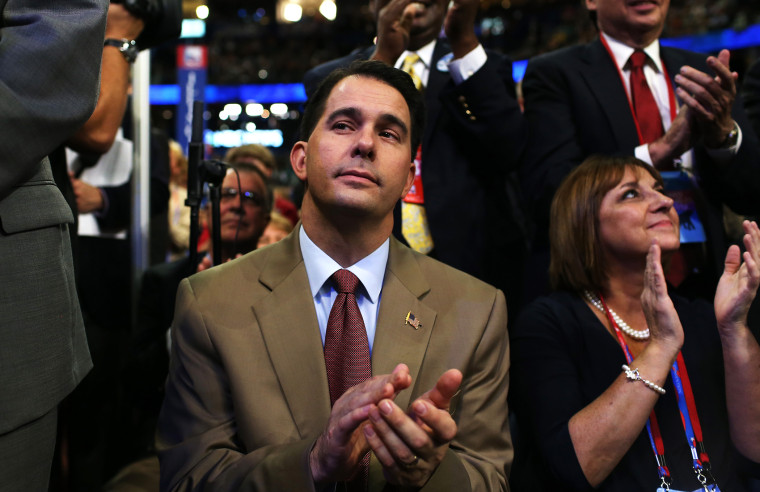Wisconsin Governor Scott Walker is on a media blitz in Washington this week, raising his profile ahead of what could be a compelling presidential campaign in 2016.
Walker's book, Unintimidated: A Governor's Story And a Nation's Challenge, is focused primarily on his 2011 fight to limit collective bargaining rights for state workers. The proposal, which ultimately succeeded, drew tens of thousands of protestors to the statehouse and prompted a recall attempt, which ultimately did not succeed.
"I think voters don't mind fighters as long as they believe we're fighting for them," Walker told reporters at a breakfast hosted by the Christian Science Monitor.
The battle made Walker a folk hero on the right. But he also decided to put the brakes on more far-reaching bills targeting labor after the episode; things have calmed down as a result. Other governors, most notably New Jersey's Chris Christie, have tended to dominate the national news more in the two years since.
With his current media tour, Walker is trying to remind conservatives why they fell in love with him first, arguing that his personal victory proves the GOP can demand sweeping change while still winning elections.
He can't linger too long, however. He's up for re-election in 2014 and faces a much tougher race than Christie's, which never threatened to become competitive
"I'm not focused on the national level, I'm focused on being governor," Walker told reporters.
But if he makes it to a second term, he's not ruling anything out. And he has plenty of ideas about how his own political and policy style could translate to a national audience.
The most notable is his take on social issues. He's pro-life and signed an ultrasound bill into law this year, but he says national Republicans are harming themselves by putting too much emphasis on abortion and gay marriage.
"The difference is as governors we focus on the things that matter most to people and those are economic and fiscal issues," he said at the event. "I'm pro-life like most Republican are governors are pro-life. I don't apologize for that, but i dont focus on it, I don't obsess on it."
Walker also said he was concerned the party, especially its 2012 presidential candidates, had made "I'm not Barack Obama" their chief selling point without a compelling argument of their own. In particular, he said he wanted Republicans in 2014 to run with "a more aggressive focus on a market driven alternative to Obamacare" rather than merely banking on the law's struggles to provide votes alone.
In Wisconsin, Walker took a unique approach to the law. Like most Republican governors (although not Christie), he refused federal funding to expand the state's Medicaid program. But in an interesting twist, he made use of the federal exchanges to revamp the state's existing Medicaid program instead. Under his approach, Medicaid will take on about 83,000 poor Wisconsin residents previously on waiting lists by kicking out 77,000 higher income participants and moving them onto the exchange, where they'll be eligible for federal subsidies
"I will have 224,000 fewer people uninsured, I will have a net reduction of people on Medicaid, for the first time in our state's history I will have everyone living in poverty covered," he said.
It's not an idea that could work anywhere else, mainly because Wisconsin's Medicaid program has unusually generous eligibility levels -- one could qualify at 200% of the federal poverty line before Walker's changes, which bring it down to 100%. In states that have stingier qualifying levels and aren't accepting the Medicaid expansion, current beneficiaries are too poor to get subsidies on the exchanges, a gap affecting about 5.2 million people.
It's also an unusual move politically. The Republican governors who turned down Medicaid dollars are positioning themselves as uncompromising opponents of the law. But Walker's plan derives its benefits from the federal dollars now flowing into the exchanges, meaning it's predicated on the law's success. That could come back to haunt him in a primary debate.
Walker may not be perfect and he may not be an exciting speaker, but he knows nothing unites the right like making the left angry. Walker's book is overloaded with red meat, opening right with a portrait of the lefty protestors who descended on Madison with their "bullhorns, drum circles, bagpipes, and chanting and singing." Passages like the one below evoke Walker as a kind of Republican Dante, willing to descend into the deepest circles of hippie hell for his party:
The protesters in the capitol accosted anyone in a suit, shoving cameras in their faces and demanding to know who they were. The building was strewn with garbage and empty pizza boxes. It was so packed with human bodies that there was no way to move around, much less clean. After awhile the floors became covered with a disgusting film, and the odor of unwashed humanity wafted through the hallways. The place smelled like a Port-a-John. When the protesters eventually left, work crews with power washers had to spend days scrubbing the building from floor to ceiling. People were smoking pot inside the capitol. There were so many sleeping bags, inflatable mattresses, and tents that my staff often joked about how many "protest babies" there would be in nine months' time.
Walker's resume could make him an intriguing dark horse in 2016. Christie has serious vulnerabilities with Republican primary voters, many of whom are upset with his friendly relationship with the president and his willingness to turn his famously combative rhetoric on tea party Republicans. If he fails to gain traction, Walker could make a strong case that he has the right combination of steady demeanor, conservative victories, and executive experience to placate both the establishment and activist wings of the party.
